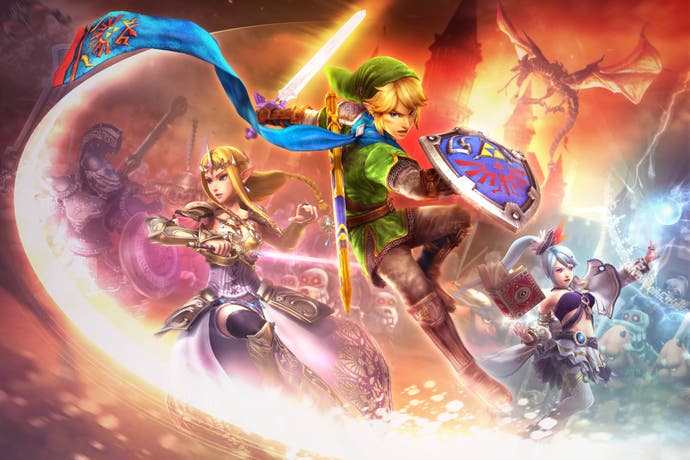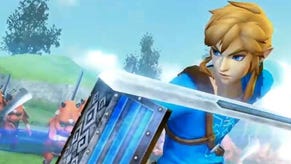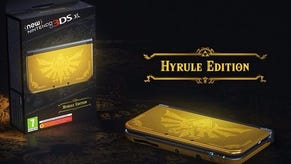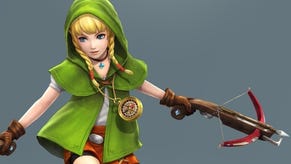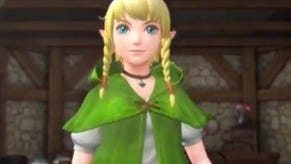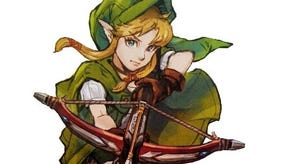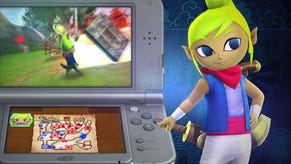Hyrule Warriors review
A link between worlds.
It's become a clichéd observation, but one that Nintendo nevertheless continues to reinforce: the Legend of Zelda series is not a continuing saga so much as it is a recurring myth. The story never advances. Rather, its tale is retold in fresh ways with each new release, using a cast of recognisable characters and familiar props. It's only Nintendo's restless design and ingenuity that keeps us from tiring of the legend's telling.
Tecmo Koei's Dynasty Warriors series (and its clutch of boisterous spin-offs, known collectively as 'Musou') takes the opposite approach. The mechanics in each game remain resolute as you take control of a cartwheeling warrior who spins and slices through hundreds of listless foes. Your aim is always to turn the tide of battle, gaining ground by capturing keeps and other fortifications in order to create new routes and entry points for your troops. The theme of each game, meanwhile, switches, from ancient China to feudal Japan and even, in the Gundam spin-offs, to robot wars in space.
Hyrule Warriors' combination of the Zelda myth with the machinery of Musou is a curious one, then. For one thing, Nintendo's evergreen series isn't a natural narrative fit. Zelda games feature a solitary protagonist and no large-scale battles (the green-suited Link approaches his foes one-on-one; his arcing sword attack is mainly used to chop down the grass in search of rupees). There are no generals on each side of the Zelda war to lead grunt armies into battle, no empires that tussle for territory and dominion whose flags can be raised in victory. Hyrule Warriors bears testament to Zelda creator Shigeru Miyamoto's rare visionary talent, then (he reportedly insisted that the game remain true to the Dynasty Warriors template). This is, if not the best Musou game yet, then certainly the most approachable and textured.
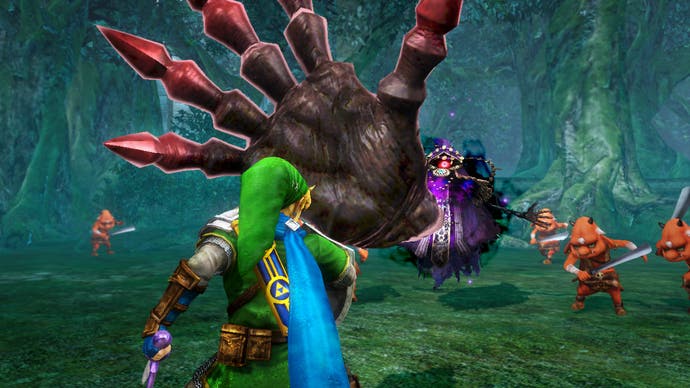
The Musou games are often subject to a category error. People assume that they are simplistic fighting games that reward the player who is able to mash their way through the sea of enemies with the sharpest button presses. Certainly, combat is the primary means by which you express yourself in the game. Each of the game's 13 characters (nine of whom are unlocked during the course of the main Legend Mode) has a dazzling repertoire of swipes, uppercuts and cartwheeling kicks which can be strung into elaborate chains of attack. These are further complemented with special moves (which are triggered when you fill the relevant gauge) and temporary magical frenzies, during which your attacks hit harder before a path-clearing finishing move that can knock an entire enemy battalion into the air.
But the main game takes place not in the fingers but in the mind, as you keep a watchful eye on the mini-map in the top corner of the screen and strategically plan your advance. At the start of each battle you're dropped onto a battlefield dominated by the opposing forces. Accompanied by a handful of troops, you sweep across the map, taking control of keeps and other fortifications. (Inside these, you must defeat a set number of enemies in order to lure the keep's boss out. Once he is toppled, you gain control of the keep, which spawns friendly soldiers onto the battlefield.) As you begin to turn areas of the map over to your side, your soldiers become emboldened, while enemy troops can become disheartened. In this way, Hyrule Warriors seeks to replicate some of the rhythm and movement of medieval battle.
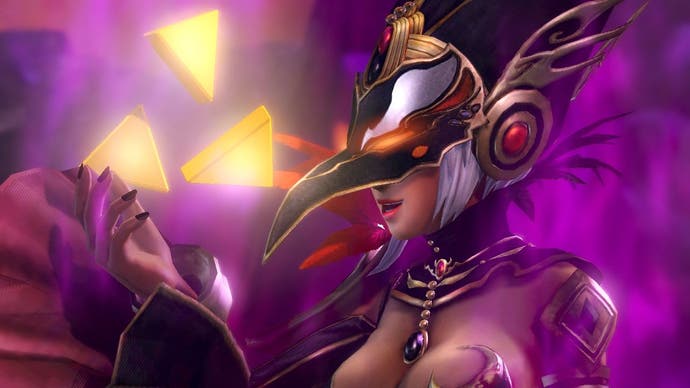
Your steady progress in turning the map from red to blue control is routinely interrupted as friendly characters scream for assistance on other parts of the battlefield, or when you're required to head to a specific location in order to clear some boulders with an armful of bombs or request the assistance of a magical being. At some point during each battle a gigantic spiderweb settles over an area of the map, indicating that there is a golden, item-giving Skulltula temporarily hidden somewhere within its vicinity. Oftentimes you'll need to make snap decisions as to which emergency to head toward, while simultaneously attempting to manage the natural ebb and flow of the battle around you.
As you defeat enemy leaders and, in most stages, bosses (each of which is vulnerable to one of Link's familiar tools) you collect materials that can be used to unlock new skills and abilities, and rupees, which can be spent on upgrading your equipment and levelling up those characters in whom you have invested less time. There's a Diablo-esque emphasis on collecting and upgrading equipment - you can take a skill from one weapon and, using the Smithy, apply it to another - but unlike in Blizzard's game, the true appeal of Hyrule Warriors is in the dynamic, mid-battle strategising rather than the consumerist glee of incrementally bettering your possessions.
Zelda's props, furnishings and alumni have been applied to the Musou template with skill and elegance. Each character feels unique to play; Link's assured sword play is nothing like Ganondorf's slow, powerful body slams or Midna's jittery speed and weaponised hairdo. Familiar landmarks such as Hyrule Field, Gerudo Desert and Death Mountain play host to familiar characters - even the Deku Tree makes an appearance. Discover a chest and each character will open it with the series' memorable sense of ceremony, and the story even offers more than one riposte to those who have bemoaned the titular princess's ongoing characterisation as a helpless, passive damsel.
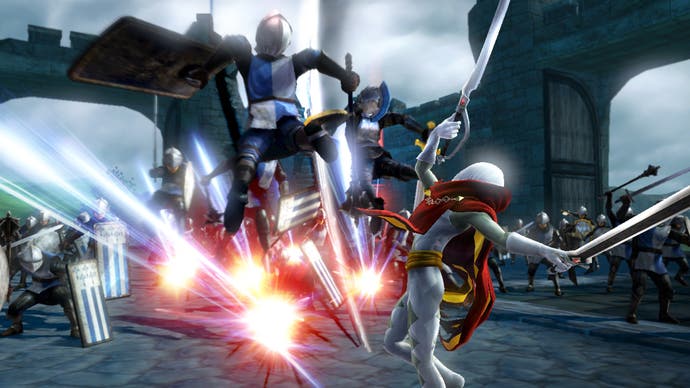
Each of the game's 18 main stages can be played at four different difficulties, with different events occurring at each, encouraging the repeat play that is necessary to unlock a single character's full set of abilities. Adventure Mode provides a secondary, vast playpen. Here you're presented with a Famicom-esque map of Hyrule that's divided into 128 squares. Each square features a single mission with special rules (such as 'defeat 400 hundred characters within five minutes' or, 'defeat every enemy on a battlefield in which every attack is devastating'). Items, experience, heart containers and rupees earned here contribute to your character's development across the entire game, so it's a useful as well as engaging diversion.
Hyrule Warriors, like every Musou game, is an acquired taste. But here, dressed in Zelda's pea-green livery, with the series' attendant tinkling melodies, idiosyncratic characters and memorable locations, it's unusually friendly and engaging. The genre is often unfairly criticised for being a mindless power fantasy in a medium that specialises in mindless power fantasies. But Hyrule Warriors rewards thoughtful play and demands a strategic approach that transcends the brute force combo-strings of its moment-to-moment gameplay. The marriage of Zelda and Musou is an unexpected success, then - a game that recounts the Zelda myth not just in a new way, but in a whole new language.
